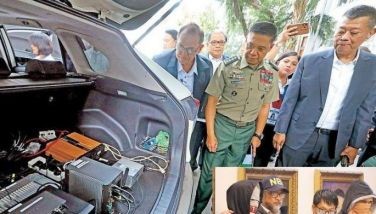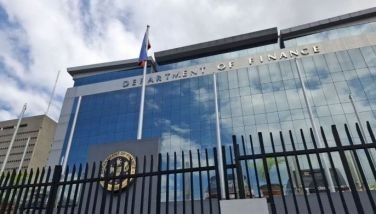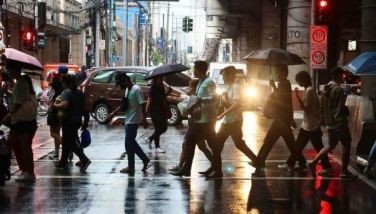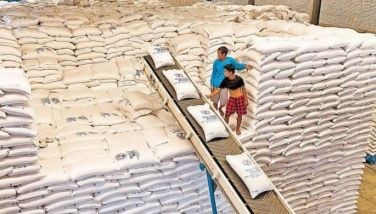Tropical cyclone enters PAR tomorrow
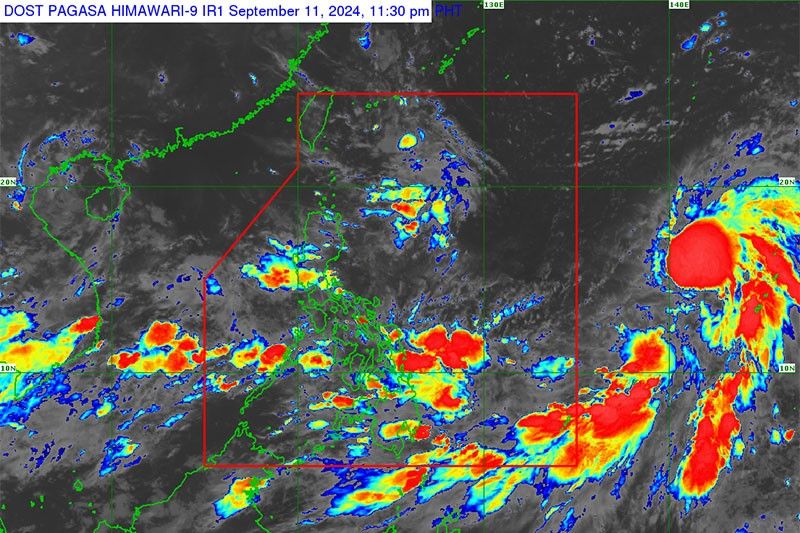
MANILA, Philippines — The Philippines’ sixth tropical cyclone this year is expected to enter the country’s area of responsibility tomorrow, according to the Philippine Atmospheric, Geophysical and Astronomical Services Administration (PAGASA).
Ferdie (international name Bebinca) is expected to intensify into a severe tropical storm in the next 24 hours and may reach typhoon category today.
“This tropical cyclone is expected to exit the country on Saturday morning. It will remain far from the Philippine landmass,” the state weather bureau said yesterday.
Eastern Visayas, Bicol and Caraga are already experiencing cloudy skies and rains, PAGASA weather specialist Obet Badrina said at a briefing.
“There is a small chance that the cyclone will make landfall in the country, but it will enhance the southwest monsoon as it moves northwestward,” he said.
The enhanced southwest monsoon will also bring rains to Central Luzon, Metro Manila, Calabarzon and Mimaropa, Badrina noted.
Heavy rains are expected in the northern and western portions of Mindanao, PAGASA said.
Prepare for Ferdie
Farmers and fisherfolk must prepare for Ferdie, the Department of Agriculture (DA) said yesterday.
Mature crops should be harvested and seed reserves must be secured, the agency noted.
“Relocate farm machinery, equipment and other farm tools to higher ground, secure sufficient feeds and water for relocated animals and clear drainage in irrigation and rice paddies from obstructions to prevent flooding and promote fast water drainage,” the DA recommended.
Philippines tops World Risk Index for 3rd year
The Philippines remains at the top of the list of countries most exposed and vulnerable to disasters, based on the 2024 World Risk Index.
For the third consecutive year, the country’s disaster risk remains “very high,” scoring 39.99 in exposure and 55.03 in vulnerability, or a geometric mean of 46.91 out of 100.
In 2023, the Philippines scored 46.86 and 46.82 in 2022. Scores above 12.89 are classified as very high.
Citing 2020’s Super Typhoon Rolly (international name Goni) at the height of the pandemic, the report said destroyed homes, overcrowded evacuation centers and COVID-19 cases led to a dramatic increase in humanitarian needs and negatively impacted the population’s mental health.
“The Philippines is home to many low-income families, many of whom live in vulnerable coastal areas. The coronavirus pandemic exacerbated their vulnerability. As many evacuation centers were overcrowded and compliance with social distancing measures was difficult to maintain, the pandemic increased the risk to people affected by the typhoon,” researchers said.
Other countries with high disaster risk were Indonesia (41.13), India (40.96) and Colombia (37.81), while the lowest were Monaco (0.18), Andorra (0.28) and San Marino (0.35).
“Exposure represents the extent to which populations are exposed to and burdened by the impacts of earthquakes, tsunamis, coastal and riverine floodings, cyclones, droughts and sea level rise,” the index explained.
“Vulnerability maps the societal domain and is composed of three dimensions: susceptibility, coping, adaptation,” it added.
Multiple crises such as natural events, pandemics, wars and conflicts “are increasingly overlapping and amplifying each other,” the report noted.
The latest index, which ranked 193 countries and territories, was released by the Institute for International Law of Peace and Armed Conflict at the Ruhr-University Bochum in Germany.
School repair funds
Twelve public schools in disaster-prone areas will each receive P500,000 for the rehabilitation and repair of classrooms, under an agreement between the Department of Education (DepEd) and the Land Bank of the Philippines.
Beneficiaries are schools with less than four classrooms, usually makeshift and have no electricity or funds for repairs or new construction.
An additional P1 million has been provided by Land Bank’s Leasing and Finance Corp. and Resources and Development Corp.
Under the agreement, schools division offices handling the 12 schools will oversee adherence to government standards and facilitate learning continuity during repairs.
School heads will manage documentation and updates, while schools division engineers will coordinate with Land Bank’s technical team for the repair activities.
Education Secretary Sonny Angara and Land Bank president Lynette Ortiz signed the two-year agreement.
Ortiz said Land Bank plans to connect DepEd with other banks to include the agency’s Adopt-a-School program as part of their corporate social responsibility programs.
From 2020 to 2022, the DepEd targeted to repair 260 schools in geographically isolated and disadvantaged areas, with a budget of P4.4 billion.
As of February 2023, 73 sites have been completed while construction is ongoing in 152 sites. Other sites are pending, under procurement or reverted. – Janvic Mateo, Neil Jayson Servallos
- Latest
- Trending


















